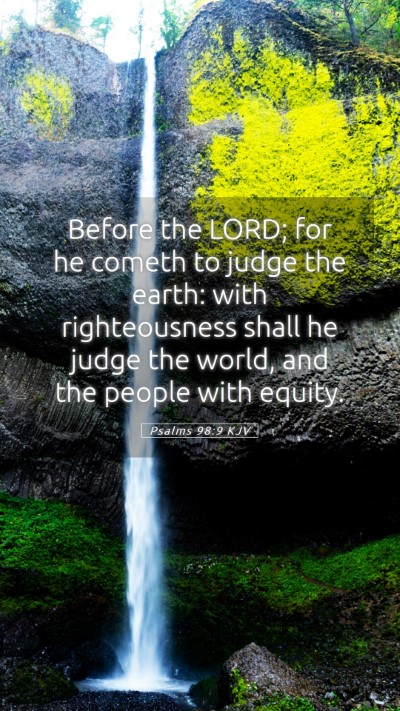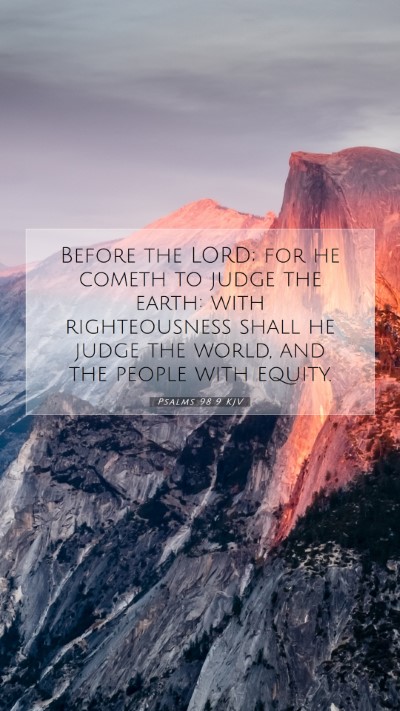Psalms 98:9 - Bible Verse Meaning and Commentary
Psalms 98:9 states, “Before the Lord; for he cometh to judge the earth: with righteousness shall he judge the world, and the people with equity.” This verse encapsulates the righteous character of God and His forthcoming judgment. It carries profound insights significant for understanding the themes of divine justice and equity as portrayed throughout the Scriptures.
Understanding Psalms 98:9
This verse serves as a call to recognize the Lord's rightful authority and the impending judgment that He will bring upon the earth. As various biblical commentaries elucidate, the psalm emphasizes several key themes:
- The Coming of the Lord: This signifies an event in which God will manifest His presence to show His authority over creation.
- Judgment: The verse indicates that God’s judgment will not be arbitrary but based on righteousness and fairness.
- Righteousness and Equity: These attributes underscore the moral integrity of God, ensuring that judgment is not only just but also fair to all people.
Insights from Public Domain Commentaries
Matthew Henry's Commentary
Matthew Henry emphasizes that the psalm invites all of creation to rejoice in the expectation of God’s righteous reign. He interprets the phrase “before the Lord” as a summons for the universe to recognize God’s majesty and prepare for His judgment. Henry highlights that God’s judgment will be characterized by righteousness, assuring us that His decisions will be inherently fair and just.
Albert Barnes' Notes on the Bible
Albert Barnes provides an interpretation that focuses on the apocalyptic implications of the judgment and how it pertains to God's relationship with humanity. He views this passage as a proclamation of hope, affirming that divine justice will prevail over injustice. Barnes notes that “the people with equity” speaks to God’s concern for marginalized groups, ensuring every voice is heard in the court of divine judgment.
Adam Clarke's Commentary
Adam Clarke emphasizes the universal applicability of God’s judgment—highlighting that it is not limited to Israel but extends to all nations. He posits that God’s justice is perfect and founded on truth, ensuring that every individual receives their due. Clarke also addresses the emotional and spiritual response that believers should foster as they await this divine evaluation.
Thematic Breakdown
As we delve deeper into Psalms 98:9, several themes emerge that are crucial for biblical understanding and interpretation:
- Hope and Justice: The text assures believers of hope through the establishment of divine justice.
- The Sovereignty of God: There is a divine authority encapsulated in the coming judgment, which resonates throughout Scripture.
- Equity in Judicial Matters: The focus on equity stresses the importance of fairness in human interactions as an echo of God's character.
Applying Psalms 98:9 to Daily Life
Believers are encouraged to reflect on the implications of this verse and to seek to embody righteousness and fairness in their daily lives. By understanding Scripture, we can live out the principles instilled by God’s law:
- Embrace Righteousness: Aim to act with integrity in personal and communal life.
- Seek Justice: Advocate for equitable treatment of all individuals in society.
- Prepare for Accountability: Recognize that our actions contribute to the larger narrative of God’s justice.
Cross-References
For a more comprehensive understanding, consider these related verses:
- Isaiah 61:8: God loves justice and hates robbery, establishing His righteous standards.
- Romans 2:6: "Who will repay each person according to what they have done," reflecting the theme of divine judgment.
- Matthew 25:31-46: The parable of the sheep and the goats emphasizes the criteria of God's judgment based on our actions towards others.


